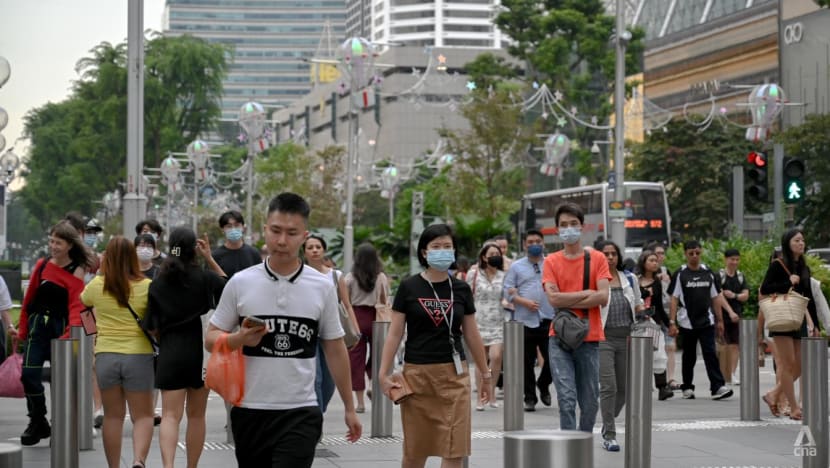Commentary: Prepare to pay more for GST in 2023 and beyond
The GST rate hike that took effect on Jan 1 will be mitigated somewhat by government offsets, but there are a few other GST changes that came into effect on that day that will result in higher expenses. Grant Thornton partner Koh Soo How walks us through the impact on consumers.

File photo of people crossing the road in Orchard Road in Singapore on Oct 19, 2022. (Photo: CNA/Hanidah Amin)
SINGAPORE: Timing is everything when it comes to introducing a new tax or raising tax rates. With an impending slowing economy and growing global recession amid rising inflation and interest rates, it might not have been the most ideal time for the Goods and Services Tax (GST) rate to be raised to 8 per cent on Jan 1.
Nonetheless, the Singapore Government has pressed on to raise the rate, which will further increase to 9 per cent at the beginning of 2024.
The Government has always defended its decision to raise the GST to support the increase in healthcare spending for an ageing population. It has also argued that higher-income Singaporeans, foreign residents and tourists would bear the brunt of the GST increase, as they do not get the benefit of GST Vouchers and publicly subsidised education and healthcare.
Further, the S$8 million Assurance Package will offset the impact of the GST rate increase for most Singaporeans over the next five years (and 10 years for lower-income households), with high expectations for Finance Minister Lawrence Wong’s “Valentine’s Day present” at the upcoming Budget on Feb 14 to help Singaporeans cope with cost-of-living issues.
For sure, prices will rise due to the higher GST rate, but several retailers and supermarket chains have announced that they will absorb the additional 1 percentage point GST increase for key household essentials and not raise prices for a period of time.
To counter any unjustified price increases, the Inland Revenue Authority of Singapore (IRAS) has also sent out strong messages to businesses not to use the GST rate increase as an excuse to raise prices unjustifiably.
The IRAS has also said that it will conduct audits to check that the correct GST rate is applied by businesses and look into specific feedback on non-compliance with the GST rate change rules. Furthermore, the Committee Against Profiteering (CAP) and other bodies such as the Consumers Association of Singapore (CASE) will not hesitate to make public errant businesses that seek to profiteer on the pretext of rise in GST.
While the above initiatives will go some way to cushion Singaporeans from the GST rate increase, we can expect to pay more in GST with the other tax changes that came into effect on Jan 1. We look at those changes below.
PURCHASING SERVICES FROM OVERSEAS
Since January 2020, consumers in Singapore have been subject to GST on digital services supplied by overseas vendors who had to register for and charge GST if their annual global turnover exceeded S$1 million and sales to Singapore consumers exceeded S$100,000. The GST may not be apparent in some cases if the amount consumers paid to the overseas service provider is inclusive of GST.
What is certain is that GST would have applied to online subscription-based news and magazines from overseas; TV, movies, and music streaming; online gaming and apps; office software and cloud storage services. These services are essentially automated with minimal or no human intervention.
At the beginning of this year, however, GST for imported non-digital services also kicked in, meaning that online professional and personal services that were previously excluded from the scope of digital services are now taxable.
These include distance learning and education classes, professional memberships and consultancy, online counselling, remote health and fitness services - all of which became popular during the COVID-19 pandemic and circuit breaker period.
Consumers of services from abroad will have to bear the additional GST charge if the service provider registers for GST.
POSTAL OR COURIER IMPORTS OF LOW-VALUE GOODS
The convenience of online shopping has seen many of us buy goods from overseas marketplaces, for which no GST was payable if the value of the goods imported via post or courier did not exceed S$400.
Such GST-free parcels became a thing of the past on Jan 1, with the overseas vendor, electronic marketplace or re-deliverer of the goods now required to register for and impose GST on low-value goods valued up to S$400.
Goods that are valued higher than S$400 will continue to be subject to GST, which is collected by Singapore Customs via the SingPost mobile app, SAM kiosks or at any of post offices or by the courier service provider before delivery.
The overseas shopping relief of S$500 if we are away 48 hours or more, or S$100 if away for less than 48 hours, remains unchanged, at least for the time being.
TRAVEL ARRANGING SERVICES
The recovery in air travel has seen a surge of “revenge travel” by many Singaporeans in 2022 despite higher air fares. The GST was kept in check as the fees charged by travel agencies for the booking of overseas holidays were zero-rated.
However, from Jan 1 this year, travel agencies will have to add 8 per cent GST if their travel arranging services are provided to a Singapore traveller.
While air fares remain zero-rated, they are expected to remain high with rising fuel costs, which together with the GST will make overseas tour packages more expensive from 2023.
BE PRUDENT IN SPENDING
The convergence of the GST changes on Jan 1 means that we will pay more in GST in future. While we can look forward to government help in cushioning the GST rate increase, the other GST changes have wider impact on overall consumer spending.
In the current climate of high inflation and economic uncertainty, it may pay to be prudent and be selective in our discretionary spending on imported goods and services or on overseas holiday packages.
Koh Soo How is partner leading the GST practice at Grant Thornton Singapore.



















